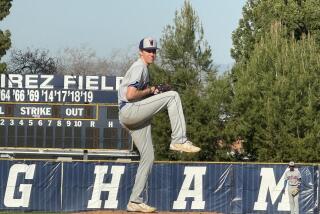Loyola Marymount Will Try to Have Fun in the Sun : Freshman Shortstop Gomez a Big Reason for Team’s Success
- Share via
When baseball practice began at Loyola Marymount last fall, Chris Gomez was only three months past 18, and his cheeks still had a rosy gloss to them.
So Loyola Coach Chris Smith decided to keep the assignments simple, and the pressure to a minimum.
“I just told him to go stand out there and catch the baseball,” Smith said.
Gomez, who beat out incumbent Darrel Deak for the position, has done far more than stand out there and catch the ball.
He responded to Smith’s low-key approach by hitting .376 in his freshman season, second in the West Coast Conference only to teammate Rick Mediavilla (.421).
He hit a conference-leading 24 doubles, and drove in 61 runs (fourth in the WCC). He hit eight home runs.
Gomez also hit safely in 19 consecutive games--the longest streak of any Loyola player--which was broken only when Pepperdine’s Kipp Landis held him hitless in three at-bats in the season finale Saturday.
He was also steady in the field, committing only 13 errors in 60 games for a .958 fielding percentage.
Gomez helped to turn 47 double plays, teaming with senior second baseman Kevin Van de Brake for one of the West Coast’s slickest keystone combinations.
Last year at this time, Gomez was worried about how long his Lakewood High team would last in the Southern Section 5-A Division playoffs. This season, Gomez could possibly reach the College World Series, held next month in Omaha, before he reaches his 19th birthday.
Loyola begins round-robin play today at Tempe, Ariz., in the NCAA West II Regional. The winners of the eight six-team NCAA regionals advance to the College World Series.
The third-seeded Lions (45-15), 13th-ranked in the nation, will meet Washington State (46-17) in a first-round game at noon. The other four teams in the regional are UC Santa Barbara, Oklahoma State, Pennsylvania, and host Arizona State.
Part of the secret to Gomez’s success this season is a change in thinking. Smith told him not to worry about hitting.
“Coach Smith told me just to play defense, and if I hit anything at all, it would be a plus,” Gomez said. “He said to not worry about coming out of the lineup if I went into a big slump.”
Smith said that if his freshman shortstop would have hit .200 or .250 this year, he would have been happy.
Instead, he’s ecstatic.
“Not only can that kid hit it, he can catch it and throw it,” Smith said. “Not many young players have that kind of balance. Plus, he has a natural feel for the little things--like how to pick a hop on defense and how to run the bases.
“Basically, he just shuts up and gets the job done.”
When Gomez arrived at Loyola, he had been recruited by both colleges and pros. He had been a three-year starter at Lakewood, hitting .422 as a junior and .430 as a senior.
The California Angels selected him in the 37th round of the June 1989 draft, as an “in case” pick. Gomez had already made up his mind to play baseball in college, so the Angels would have offered him a contract only if a scholarship offer fell through.
UCLA was an early favorite for Gomez’s services, but the Bruins backed off, leaving Loyola and Cal State Long Beach to battle it out.
Loyola and Smith won out, mostly because Gomez had a better chance to start for the Lions, and because Mike McNary and Paul Graves--Gomez’s former teammates at Lakewood--were already on the team.
The 6-foot-2, 175-pound Gomez has fit in perfectly for the Lions. In the field, he has soft hands, good instincts and quick feet.
He’s at his best in pressure situations. In a nonconference game against UCLA at the Bruins’ Jackie Robinson Stadium, Gomez made several big plays in the field to help the Lions win, 11-10.
In the fourth inning, after pitcher Steve Surico walked the leadoff man, Gomez stepped neatly across the middle to start a double play.
One batter later, after UCLA’s Robbie Katzaroff singled, Gomez went deep into the hole for a backhand stop on Mike Hankins’ ground ball. He fired an off-balance throw across his body to Van de Brake to force Katzaroff at second for the final out.
“I don’t like errors,” Gomez said. “I’d rather strike out three times a game than make an error. It’s too embarrassing to boot one.”
Gomez doesn’t wilt in the clutch at the plate, either.
He led the team with seven game-winning hits, one more than catcher Miah Bradbury--an All-American who turned down a contract from the Philadelphia Phillies to return for his senior season.
“I thought the pitching was going to be a little tougher,” he said. “Guys’ fastballs aren’t as hard as I thought they would be. They do throw off-speed pitches for strikes a lot more. But that’s about the only difference.”
The major adjustment to college ball, Gomez said, is playing 60 games, instead of the 30 that high school teams usually play.
“It takes a lot of concentration to be ready for every at-bat, especially when you’re getting so many of them,” he said. “Every once in a while, Coach Smith asks me if I’m getting tired.
“But I’m not getting tired yet.”
More to Read
Get our high school sports newsletter
Prep Rally is devoted to the SoCal high school sports experience, bringing you scores, stories and a behind-the-scenes look at what makes prep sports so popular.
You may occasionally receive promotional content from the Los Angeles Times.






